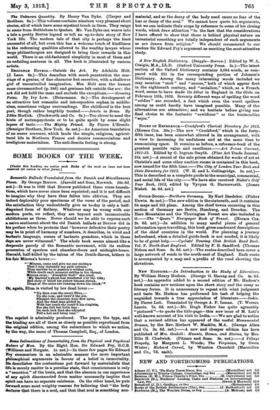SOME BOOKS OF THE WEEK.
[Trader this heading ire notice such Books of the week as have not been reserved for resists in other forms.] Romantic Ballads Translated from the Danish and Miscellaneous Pieces. By George Borrow. (Jerrold and Sons, Norwich. 10s. 6,3, set.)—It was in 1826 that Borrow published these verse tra.nshr- lions, which have never since been reprinted; and it is not difficult to imagine why they have thus fallen into oblivion. They are indeed deplorably poor specimens of the verse of the period, and the satisfaction they undoubtedly give us to-day is only a half- disguised form of flattery. Whatever may be wrong with our modern poets, we reflect, they are beyond such inconceivable childishness as these. Never should we be able to express such a naive sentiment about the old Danish ballads as Borrow did in his preface when he protests that "however defective their poetry may be in point of harmony of numbers, it describes, in vivid and barbaric language, scenes of barbaric grandeur, which in these days are never witnessed." The whole book seems almost like a desperate parody of the Romantic movement, with its endless procession of spectres and chamber-doors and midnight-hours. Harrold, half-killed by the talons of the Death-Raven, totters to his fair Minona's bower Minona, come and give me one embrace That I may instantly my path retrace.' Thus warbles he in passion's wildest note, While death each moment rattles in his throat. MiII0110. came : 'Almighty God I ' she cried, • My Harrald's ghost has wandered o'er the tide; Red clots of blood his yellow tresses streak, Drops of the same are running down his cheek.""
Or again, Eliza is visited by her dead lover
" Up then rose the sweet Eliza,—
Up she rose, and twirl'd the pin.
Straight the chamber door flew open,
And the dead man glided in.
With her comb she comb'd his ringlets, For she felt but little fear : On each lock that she adjusted Fell a hot and briny tear."
The reprint is admirably produced. The paper, the type, and the binding are all of them as closely as possible reproduced from the original edition, among the subscribers to which we notice, by the way, the name of Thomas Campbell, Esq., of London.


















































 Previous page
Previous page